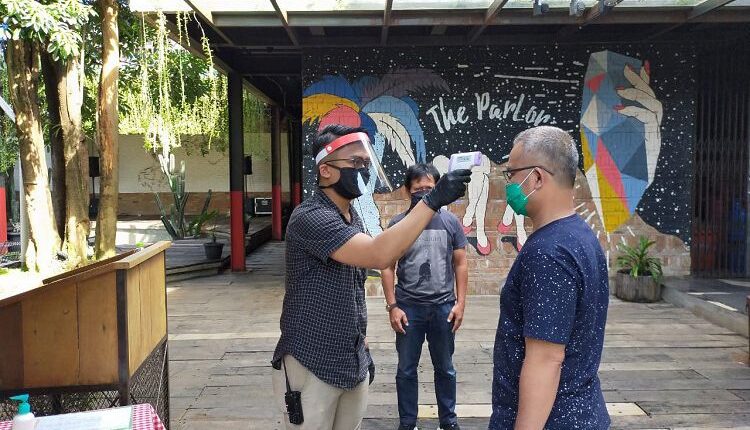Adaptation of New Habits to Restore the Tourism Sector
By: Puguh Susilo )*
The tourism sector was dim due to the co-19 pandemic, this is because the PSBB policy that closed all activities that could cause crowds. So as to minimize the possibility of corona virus transmission from the cluster of tourist attractions, all tourist activities are stopped completely. However, businesses are now starting to breathe freely because some tourism sites can be opened in the phase of adaptation of new habits (New Normal) by implementing strict health protocols.
The Large Scale Limitation Policy (PSBB) to prevent Covid-19 resulted in the closure of various economic sites. The situation certainly also has an impact on the velocity of money in the tourism sector, especially lodging, souvenirs to travel service providers. However, the Ministry of Communication and Information Technology’s socialization related to the adaptation of new habits is a breath of fresh air for the people who depend on income from the tourism sector.
In the midst of the Covid-19 pandemic, Kemenparekraf increasingly actively voiced the Cleanliness, Health and Safety (CHS) program which was part of the adaptation of new habits (New Normal).
One of them, the program is targeting the tourist village. Kemenparekraf said, there are about 20 tourist villages in Magelang regency which became the initial pilot through the Clean, Beautiful, Healthy, Safe movement program, abbreviated as CAN.
This program targets around 1400 actors from 20 selected tourism villages out of a total of 52 tourism villages. Each tourist village also gets as many as 65 people. Where the people chosen will get intensive training for 5 days.
With this program, we certainly hope that the economic sector in the tourism sector can recover. CHS certainly deserves to be educational and outreach materials so that tourists can continue to comply with the health protocol.
Kemenparekraf also has made a video about the application of health guidelines and protocols that must be applied in tourist attractions and disseminating them to the public through various media. The government, through the Ministry of Manpower and Transmigration, assured that traveling under the new adaptation era and the Covid-19 pandemic could be carried out safely.
Kemenparekraf has also cooperated with every stakeholder in the tourism industry to follow the guidelines and implement health protocols to ensure the safety of tourists.
Currently the government is also focusing on attracting domestic tourists rather than attracting foreign tourists. This is based on the co-19 pandemic considerations that still occur throughout the world.
On a different occasion, the chairperson of the Covid-19 DIY Task Force Biwara Yuswantana explained that the Yogyakarta regional government had prepared various guidelines and strict health protocols to carry out tourism activities amid the co-19 pandemic and a period of adaptation to new habits.
The Provincial Government of DI Yogyakarta ensures businesses in the tourism sector such as attractions, hotels and restaurants to strictly comply with health protocols and follow the guidelines given.
Some policies to conduct tourism activities in the midst of a pandemic are by implementing strict health protocols such as maintaining distance and wearing masks, preparing hand washing facilities and infrastructure such as soap or hand sanitizers to limit the number of visitors to 50% of total capacity, and imposing rules on visiting times to the data collection of each tourist visiting the tourist attraction.
In East Java, the Surabaya Zoo (KBS) has been reopened while still tightening health protocols.
Head of Surabaya City’s Economy and Business Section, East Java Agus Hebi Dujuniantoro in Surabaya said, before KBS was opened, apparently it had been studied by various parties ranging from the Natural Resources Conservation Agency (BKSDA), the GRADUATE GROUP and the Indonesian Public Health Professional (Persakmi) to Surabaya City Health Office.
They have given permission to open KBS with several records, one of which is to reduce the capacity of visitors by 50%, which was originally 6000 to 3000.
In addition, the Surabaya Zoo zoo (PDTS) management has also conducted simulations ranging from online-based registration to visitor mechanisms before entering with various protocols while in the KBS area.
Visitors are also required to buy and make ticket payments online. So while at the location, visitors only need to scan the barcode to the officer who is in front of the entrance as proof of booking and payment.
In addition, to avoid the crowd, visitors are also required to follow the existing path. Even when seeing animals, visitors must stand on the signs that have been printed.
Adaptation of this new habit is certainly expected to move the tourism sector again which was previously affected by the pandemic. However, health protocols must still be implemented. )* Active writer in the Gunung Kidul Student Association
